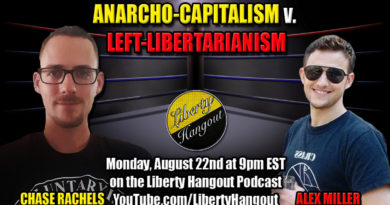A Critique Of Left-Libertarianism
So called “left-libertarianism” has attracted a substantial following within recent years. Many libertarians are unaware of what left-libertarianism is or what it entails, and until recently, its nature and scope have remained fuzzy and obscure. To his credit, Nick Ford has recently written an article “14 Questions and Answers on Left-Libertarianism” (source: bit.ly/1T6ysGI) which helps to clarify (albeit far from perfectly) the nature and scope of this elusive philosophy. His article will be used for the following analysis (sections of his article are highlighted in bold).
Prior to delving into the critique, an explication of the scope of libertarianism is in order. The essence of libertarianism is the “private property ethic”. This ethic states that all scarce goods are subject to private ownership, given they are acquired via original appropriation or voluntary exchange. Ownership entails the exclusive right to use, occupy, or employ a good free of aggressive interference. Moreover, one is and can only be the exclusive owner of his/her own physical body; this is more commonly referred to as the principle of “self-ownership”. Finally, aggression is defined as the uninvited initiation of physical interference with the persons or property of others, or threats thereof. The Non-aggression principle (NAP) may be extrapolated from the private property ethic. This simply condemns all aggression as being unjustified and criminal. Keep in mind the purpose of the libertarian ethic is to reveal under what conditions the use of physical force is justified and likewise under what conditions it is unjustified and criminal. It is this purpose which confines the scope of libertarianism to the aforementioned principles.
“1. What does the “left” in left-libertarian mean?
…This form of “left” often involves an interest in solidarity, equality and liberty for the individual and the communities they inhabit. These cultural norms are meant to work against oppressive elements in society like capitalism (which is differentiated from markets), government and things like sexism, racism, etc.” The use of ambiguous words such as “solidarity”, “equality”, and “oppressive” are commonplace in left-libertarian literature. Such terms generally have positive connotations and make room for a variety of personal (and sometimes mutually exclusive) interpretations while being vague enough to avert any attempt at their critique. A left-libertarian (LL) can (and usually does) assert an objector is engaging in a strawman argument by claiming a different interpretation of said terms than the one being critiqued. This type of equivocation serves as the left libertarians favorite tool for promoting and defending his philosophy.”
For example, does “equality” refer exclusively to rights? If so libertarians can all agree as they contend private property rights (the root of all legitimate rights) apply universally to all moral agents. Or are left libertarians asserting that everyone should be treated equally no matter their appearance, accomplishments, attitudes, beliefs,…etc.? Of course the latter interpretation is something wholly different than the former. The same applies to words like “oppressive”…are s simply using this term as a substitute for “aggression” or do they also include non-aggressive behavior, such as an individual exercising a racial prejudice when choosing whom to befriend or provide a job opportunity to, under this banner?”
As exemplified in the quote above, left libertarians often assert a false dichotomy between capitalism and markets. Capitalism is simply that economic environment where all scarce goods (including land and other means of production) are subject to private ownership. In other words, it is that environment where there is an institutional or systematic respect for and recognition of private property. Such an environment, far from being mutually exclusive with markets, is extremely conducive to them.
Finally, an opposition to racism, sexism, homophobia, and the like has nothing to do with libertarianism. One may be a nasty bigot or be absolutely free of such prejudice and still coherently identify as libertarian. Again, libertarianism is only about private property and the NAP, hence such extra social issues belong in a separate realm of inquiry altogether.
“Left-libertarians in comparison to anarcho-capitalists tend to be more critical of things like corporate culture and bureaucracy within large non-governmental firms. Examples may include things such as non-profits or corporations.”
More vague terminology can be seen in the above quote. What exactly is “corporate culture”? Well whatever it is one thing is certain: it has nothing to do with one’s libertarian or Anarcho-Capitalist disposition. (Anarcho-capitalism is interchangeable with libertarianism as defined in the beginning of this critique). A libertarian/AnCap may prefer or dislike such “corporate culture”…yet such a preference would in no way impact his/her libertarian disposition anymore than his/her preference in pizza, ice cream, or sexual partner. The following argument is not a response to anything explicitly stated in Ford’s article but still warrants mention: corporations are not inherently at odds with libertarian principles. Moreover, they require no State or legal “privilege” to exist. (Source: A Spontaneous Order Chapter 14: The Corporation bit.ly/1NRrIrm)
“It should be noted that some anarcho-capitalists care more about anarchism than capitalism and these sorts of anarcho-capitalists may tend to overlap with left-libertarians more. Particularly in that they have no real preference of whether corporations should still exist, or if everything should be privatized or not. They merely want to abolish the state, free the market, and leave it up to individuals and communities from there.
Left-wing market anarchists tend to sympathize with this position though we’d also remind these sorts of anarcho-capitalists that we are market forces and furthermore that some systems tend to be more conducive towards sustaining liberty than others.”
There are a few issues with this. First one’s preference regarding the existence of corporations has nothing to do with his/her libertarian disposition. This is a preference that exists outside the scope of libertarianism. Second, corporate firm types are no more or less conducive to sustaining liberty than co-operatives…they are just different ways to legally organize firms. Their impact on the sustenance of liberty is neutral.
“To be clear, to be a left-libertarian you do not need to be a thick libertarian.
Although it is true that this is a rare combination it does happen. Historically, you could argue Benjamin Tucker’s version of anarchism was thin. Tucker only saw the goal of an anarchist society to be a lack of physical violence and no state. Whatever else was not the business of anarchists.”
This is contradictory. The “left” prefix in left-libertarianism itself implies thick (extra NAP and PP) commitments. If Tucker truly were only for a society sans the State and violence then his preferred form of libertarianism would require no prefix. Essentially, any attempts to “thicken” libertarianism involve a perversion of its scope. Of course all of us have values that exist beyond private property and the NAP, however it does not follow from this that such values should be conflated with our libertarian disposition. They should be addressed in separate realms of inquiry, lest we ruin the integrity of the libertarian philosophy.
“Both schools of [mutualist] thought tend to advocate a private property of sorts but one that is based on personal use and occupation.”
This is where left-libertarianism not only falls outside the proper scope of libertarianism, but actually contradicts and violates its core prinicples. Once one establishes ownership over any good, including land, he is no longer under any positive burden to retain said ownership. Such ownership can only be relinquished if he explicitly revokes it, voluntarily transfers it, or dies without a named heir. (Or perhaps he may be relieved of said ownership as a form of restitution to a victimized party whose person or property he previously aggressed against.) Occupancy and Use norms (as alluded to in the above quote) fly in the face of the private property ethic as they place arbitrary positive burdens on land owners in order to retain their claims. (O&U norms require one’s land to be used in a particular way or occupied at a certain frequency if he is to retain ownership. The types of use or the level of frequency that qualify are each arbitrary).
Not explicitly mentioned in this article is the fact that left-libertarians (in their capacity as left libertarians) tend to oppose wage labor, “bossism”, and landlord/lessee arrangements. If such opposition is merely a personal preference then it falls outside the scope of libertarianism. If, on the other hand, they view these items as unjust/criminal, then their opposition would be contrary to libertarian principles because they would entail favoring abridgements of private property and freedom of contract.
In conclusion, “left-libertarianism” should be rebuked as being a perversion of libertarianism. When “left” is used as a prefix this implies that “left-libertarianism” is a type of libertarianism as opposed to communicating that one is a libertarian who also holds some additional social commitments and preferences for particular types of economic arrangements. There is nothing wrong with the latter as it properly compartmentalizes one’s non-aggressive economic and social preferences apart from his libertarian disposition. Those left libertarians who favor Occupancy and Use norms should be especially condemned as they are deceptively masquerading as libertarians while upholding anti-libertarian principles.
Article Critiqued: http://www.theanarchisttownship.freedom-blogs.com/…



You know what else is a perversion of libertarianism? Austrian economics (which is also a perversion of economics) and the NAP.